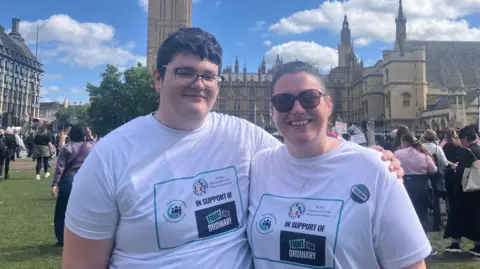Don't scrap care plans for children with special educational needs, say MPs

Individual care plans for children with special educational needs should not be scrapped, say MPs.
A new Education Select Committee report also calls for new minimum standards of support for special educational needs and disabilities (Send) in schools, as well as more training for teachers.
The government is expected to publish plans on how to reform Send provision in England this autumn. They had previously refused to rule out getting rid of education, health and care plans (EHCPs).
In response to today's report, the Department for Education (DfE) says it is listening to families as it puts together plans to "transform outcomes for every child with Send".
The Education Select Committee has spent the past eight months looking into how to achieve long-term sustainability for the Send system in England, and how to improve outcomes for children and young people.
In their report today they made several recommendations to the DfE, including:
- Keeping EHCPs and Send tribunals as a "backstop of accountability" for parents
- Establishing new statutory national minimum standards for what support schools should offer on special educational needs at all levels of need
- More Send training for all current and future mainstream school staff, including headteachers
- Investing in more state specialist schools
- Increasing per-pupil Send funding in line with inflation
The National Audit Office said last year that the Send system in England as a whole "wasn't financially sustainable" and was not delivering better outcomes for children and young people, despite big increases in high-needs funding over the last 10 years.
The number of children and young people in England with an EHCP has increased to 638,745, the highest number since they were introduced a decade ago. An EHCP is a legal document outlining the support for special educational needs that a child or young person is entitled to.
Nearly 1.3 million pupils are getting support for special educational needs in schools in England without an EHCP, but many parents value the legal rights to support that the plans set out and fight hard to get them put in place.
Helen Hayes MP, chair of the Education Select Committee, said a "root and branch" reform of the Send system was needed and that "a genuinely inclusive, well-resourced mainstream education system" will bring costs down.
"The government must develop a standardised, national framework for the support that children with Send can expect in school, long before requiring an EHCP, so that there can be confidence and clear lines of accountability."
Paul Whiteman, the general secretary for school leaders' union NAHT, agreed that all teachers should be trained in how to support children with special educational needs but said the responsibility shouldn't just lie with schools.
"There must be a collaborative multi-agency approach, with the onus not just on schools but on all health and child services to support children and young people with Send.
"There must be a recognition that funding for Send is currently insufficient and a re-thought system will need to be fully resourced in order to work."

Tracy Winchester runs the parent campaign group SEND National Crisis in Worcestershire.
She has been through three separate tribunals against her local authority to change the support in place for her son Rowan, who has had an EHCP since he was five.
She's worried that the government might make changes to EHCPs in their upcoming reforms.
"We won't stand for our legal rights being taken away, and the thought of it is horrifying. It's not to say everything is perfect right now, but without the legal rights I don't know where we would have got to.
"Local authorities have to be careful with their budgets but, ultimately, this is our kids' education. If we haven't got that legal protection, where do we stand?"
A DfE spokesperson said: "The report rightly highlights the need for actions we're already taking, to make sure that evidence-based support is available as routine, without a fight, for every child who needs it - from significant investment in places for children with Send, to improved teacher training, to our Best Start Family Hubs in every local area."
BBC





